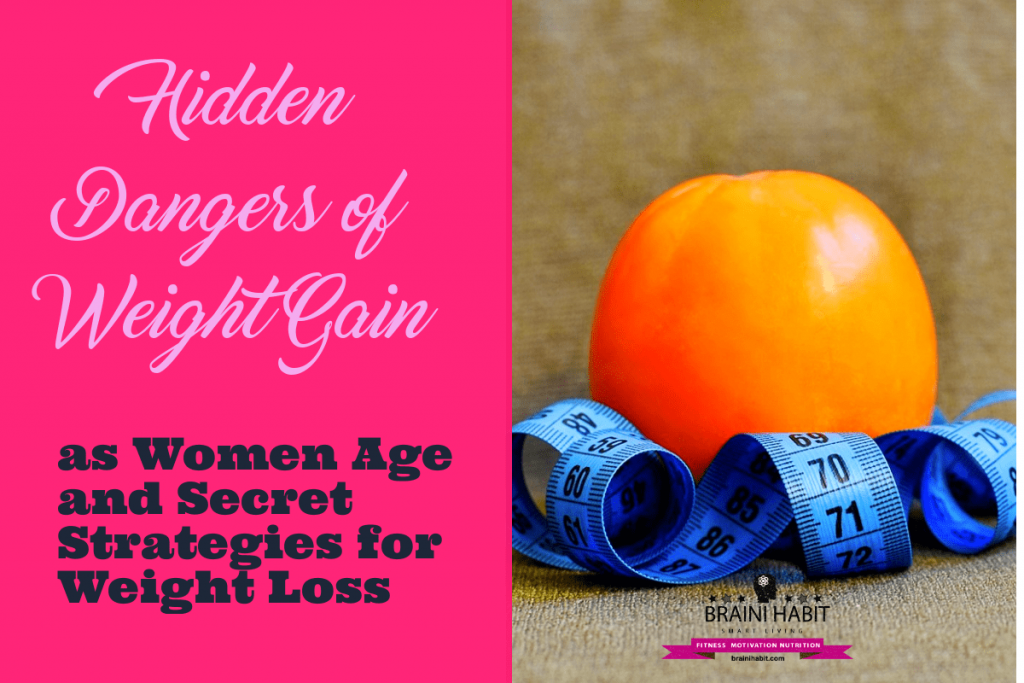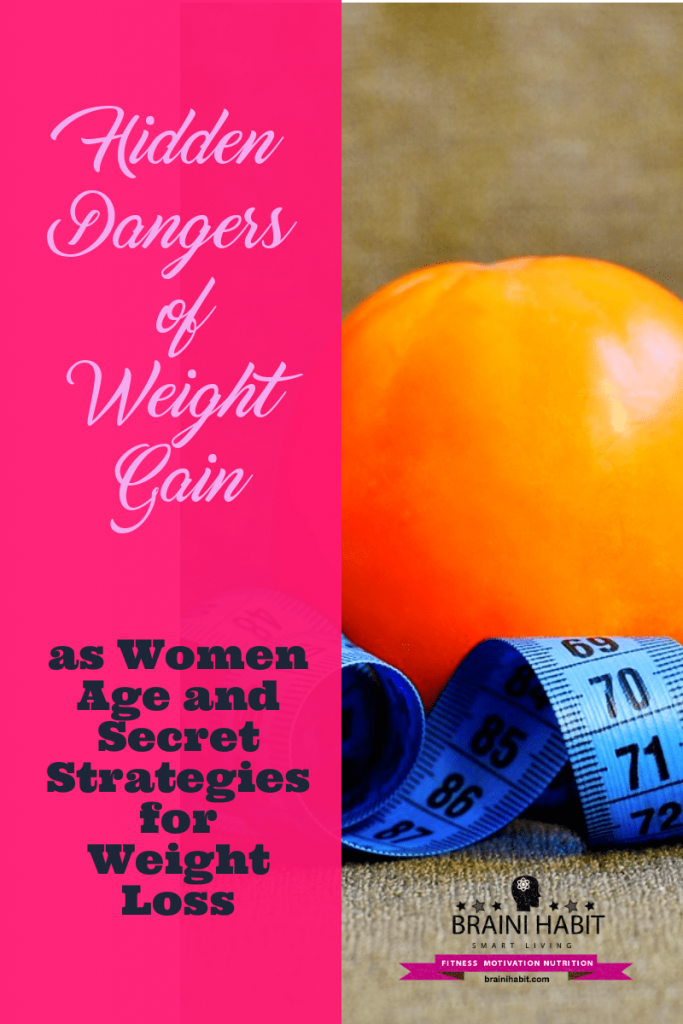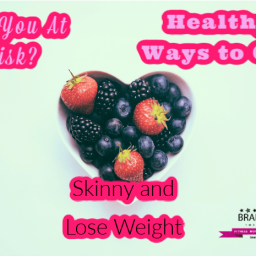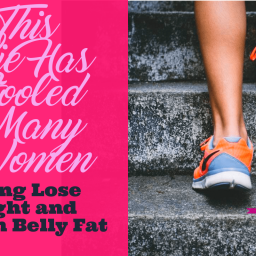As the years go by, changes happen in our organisms, which make us much more likely for weight gain, usually in the form of extra fat.
Age affects our metabolism not only in terms of burning calories but also reduces the effectiveness of different systems and organs, and our ability to cope with higher levels of stress.
In this article, we are going to discuss the reasons for gaining more fat with age and what we can change in our lifestyle and habits to prevent that.

- What is the energy balance of the organism?
- You can actually speed up your metabolism
- An unbalanced diet is a major contributor to weight gain
- Physical activity also decreases with age
- Stress can make you both gain weight and age faster
- Menopause is one of the most common causes
- Weight gain is related to the most common causes for death
- What to do about it?
- The bottom line on why women gain weight
What is the energy balance of the organism?
In order to understand the reasons for weight gain, we first have to go over the basics of the body energy balance.
It is the equation between calories taken in with food and drinks, and the calories being used for various things like physical activity, metabolic processes, organ function, etc.
If that balance is positive – more calories taken than burned – your body has no choice but to gain weight, and vice versa.
The calories consumed will depend on our diet, while the calories expended are determined by a combination of factors.
The factors are – basal metabolic rate, physical activity, and diet-induced energy expenditure (1).
Basal metabolic rate is our resting energy expenditure – the amount of energy needed for our body to simply function – heartbeat, brain function, kidney filtration, breathing, etc.
This doesn’t involve the energy expended for physical movements and activities.
The basal metabolic rate depends on numerous factors like body size, body composition, and hormones.
Physical activity includes all spontaneous movements, daily routines with physical activity, and physical exercises like sports, cardio, and weight training.
Diet-induced energy expenditure is the one used for digestion, transport, and storage of the food we consume. Some foods, like high-protein products, are harder to digest and lead to more calories burned for their metabolism.
Take-Away:
Whether we gain weight or lose weight depends on the balance of calories taken in vs. calories expended.
You can actually speed up your metabolism
There are many causes related to age that can lead to fat gain. The most relevant is body composition changes.
Not only we gain fat as we age but we also lose muscle. Muscle mass is something very few women pay attention to, but it has a major role in our metabolism.
While organs like brain, heart, liver, kidneys burn a lot of energy for their functions – 15-30 times more than muscle mass, those estimates are for a pound of tissue (2).
These organs are also relatively small compared to the mass of the whole body (1-2%), so the actual amount of calories burned in insufficient.
On the other hand, average muscle mass for untrained women is around 30% of total body weight and it can be easily increased with the proper stimulus (3).
This is why muscle is the main driver of our metabolisms and we need to keep it, in order to burn more energy and maintain optimal weight more easily.
After the age of 30, without the proper diet and stimulus muscle mass naturally begins to decline.
Loss of muscle mass accelerates further after the age of 40, thus it seems that our metabolism “slows down”.
Take-Away:
Age leads to progressive loss of muscle, which lowers our basal metabolic rate and makes us more susceptible to weight gain.
An unbalanced diet is a major contributor to weight gain
The diet can contribute not only to gaining weight when in a caloric surplus but also to the loss of muscle mass, and the decrease in the metabolic rate.
First of all, according to science, the calorie amount is always the main contributor to weight changes (4).
It is impossible to gain weight unless you are in a caloric surplus.
No matter how much muscle mass you have lost and how slow your metabolism has become, you will not gain weight if you consume fewer calories than your total energy expenditure.
Secondly, the diet can contribute to more muscle loss when there is not enough protein in it. Protein in the diet helps prevent muscle-protein breakdown.
However, studies show that the need for protein increase with age (5).
This is caused by the so-called protein resistance that develops in older people.
To put it simply – higher amounts of protein are required to reach the same muscle growth response compared to younger adults.
There are even suggestions that the general health recommendations for protein consumption should be changed for mid-aged or older people from 0.8 up to 1.0g of protein per kg of bodyweight.
That protein will also help with satiation as it is a nutrient that is more slowly digested.
Take-Away:
A diet without enough protein leads to loss of muscle mass and poor satiation which creates the risk for consuming more energy than expended and gaining weight.
Physical activity also decreases with age
Another major cause is that we become less and less physically active with age.
This is mostly related to our busy schedules – the responsibilities are piling up and we simply do not have the time to work out.
Also, a lot of women choose cardio instead of lifting weights. While cardio might seem easier and it is less dependable on gym or equipment, it is actually the worse choice.
As we already mentioned we lose muscle as we age. Cardio does burn a lot of calories but it also can speed up that muscle loss (6).
If you lose both fat and muscle tissue, it much more likely to gain fat later on because of decreased metabolic rate and experience the yo-yo effect.
On the contrary weight training can help you preserve your muscle mass or even built some more.
Do not worry about becoming too muscular or too bulky, women have a harder time building muscle because they have much less testosterone compared to men and less muscle mass, to begin with.
A study compared the average muscle gain of men and women performing the same exercises and having similar diets.
The results showed significant differences in muscle size after 9 weeks (7).
The result of resistance training is that you burn fat both in and out of the gym.
Evidence shows that cardio might also increase the amounts of stress on the organism and lead chronically elevated levels of cortisol – the stress hormone
Evidence collected from hair samples about the cortisol levels of over 300 endurance athletes showed significant long-term increases when compared to 70 control subjects (8).
Take-Away:
Not enough physical activity lowers our total daily energy expenditure and can’t counteract the natural loss of muscle.
Stress can make you both gain weight and age faster
Stress is a quite common problem which is also linked to age. Life constantly brings us new challenges – having children, promotions in the workplace, busy schedules, less sleep, more and more housework.
Not only our responsibilities keep increasing, but aging also reduces the capacity of our body to deal with stress.
This leads to negative effects like accelerated aging which creates a vicious cycle. The stress hormone – cortisol is one of the mediators for these effects.
Another problem with stress is the incidence of stress eating. This is what we call binges in response to your feelings. It can occur even when the person is not hungry.
It helps the person to stop thinking about their problems or to stop being anxious about not taking any actions to solve those problems (9).
Usually, stress eating involves mostly unhealthy foods, since high-caloric and high-fat food provide much better taste and comfort.
This can put a person quickly into a huge surplus and result in a significant weight gain.
Take-Away:
Chronic stress can lead to elevated levels of cortisol, accelerated aging and the incidence of stress eating behavior which all contribute to weight gain.
Menopause is one of the most common causes
With age also comes the menopause. A point where significant hormonal changes occur.
Actually, this is why menopause happens in the first place – the natural production of estrogen and progesterone decreases.
These changes affect all the organs and tissues in our bodies, and especially our metabolism.
The weight gain caused by the lack of estrogen is mainly around the abdomen (10).
Low levels of estrogen not only lower the basal metabolic rate and make us burn fewer calories, but also the extra belly fat gain increases the risk for cardiovascular diseases (11,12).
Take-Away:
Menopause is caused by naturally occurring changes in the synthesis of female sex hormones. Those changes affect the metabolism of the whole organism and results in weighing gain.
Weight gain is related to the most common causes for death
Fat gain, especially around the belly is linked to several health problems. This type of fat accumulation is called a central type of obesity or visceral fat.
First of all, it affects blood pressure and cholesterol levels. Overweight and obese people have a higher incidence of blood hypertension.
Also, the levels of bad cholesterol in their bloodstream elevate, while the levels of good cholesterol decrease (13).
Both of these processes contribute to the development of atherosclerosis and result in a higher incidence of cardiovascular diseases – the leading cause of death worldwide.
Obesity around the abdomen affects insulin sensitivity as well and raises the risk of metabolic syndrome and type 2 diabetes (14).
There is evidence suggesting that there might be a relationship between belly fat and Alzheimer’s (15).
The risk of cardiovascular diseases and diabetes is especially high if the waist circumference is more than 88cm for women and 102cm for men.
Take-Away:
With age, we are more likely to store the fat around our abdomen, which is particularly detrimental to cardiovascular and metabolic health.
What to do about it?
Eat a little less
Maintaining a caloric balance is the most effective way to prevent gaining weight at any age.
Counting calories is the most precise option to stay in a caloric balance but for most people, it is not optimal.
Calorie counting adds additional stress for some people making it highly unsustainable, while other people use it as an excuse to fill up their daily menu with mostly junk food.
This is why it is better to follow the general principles of healthy nutrition.
They can help you reduce the total amount of calories consumed while keeping yourself well satiated and not stressing about weighting and counting every food.
For example, adding protein to every meal can be a good start for preserving muscle and metabolic rate as well as achieving good satiation with the diet.
However, if we have kidney problems, we have to be careful about the total amount of protein in our diet.
Studies show that if there is any disorder in the kidney function, even if it is without symptoms, consuming a high-protein diet might worsen the condition (16).
Eating whole fruits and vegetables on every meal is another great option to reach satiation faster and for longer. The total daily recommendation is at least 400g.
Non-starchy vegetables should be preferred because they contain more fiber, but all kinds should be included to support the body with different vitamins and minerals.
Eating during the same time every day and creating a schedule can also help you plan your meals and not get unexpectedly hungry.
Snacking on food, even if it is a healthy one like nuts, is a habit that can quite easily get you out of caloric deficit.
Avoid junk foods and highly-processed foods. Not only they might contain carcinogens, but also they are usually packed with too much fat and calories.
We should be careful with some healthy foods like honey, nuts and olive oil, too. They are also packed with a lot of fat (although healthy) and calories.
It is very important to avoid overeating and stress-eating. Eat only until you are feeling full and rather skip the dessert.
Another thing to avoid is liquid foods. They provide no satiation and very often are packed with a lot of sugar and calories.
Take-Away:
In order to prevent weight gain and be sustainable, the best option is healthy eating including enough protein, fresh fruits and vegetables and a variety of healthy fats and carbohydrates in moderation.
Exercise a little more
As we said, to maintain muscle and burn more calories we need to add physical activity into our daily routine.
While it can be challenging to fit training into your schedule, many women manage to find time for an hour of cardio once in a while.
However, as we already mentioned, cardio is not the best option for long term weight loss or maintenance. It can lead to the loss of both fat and muscle.
Cardio is a good option for obese people, when we have a huge excess of fat and muscle loss is not that likely.
In such cases, we aim to lose fat quickly to improve overall health. For the long-term cardio should be replaced by weight training or another form of higher-intensity training that stimulates muscle gain.
If you implement only twice a week a full-body workout with weights, and picking just one main exercise for each muscle group, you can achieve great results without severely affecting your weekly schedule.
Take-Away:
Weight-training is the most optimal way of increasing your physical activity because it prevents weight gain, preserves muscle, and it is time-efficient.
Reduce stress levels efficiently
As we mentioned, chronic stress is a factor contributing to both aging and fat gain.
One of the best ways to deal with it is again physical activity.
Sports can become healthy stress-relief method, and replace other unhealthy alternatives like stress-eating (17).
Improving the quality of your sleep is another effective method to reduce stress.
Studies show that insufficient sleep causes people to experience more hunger and cravings, and to be less motivated for exercise during the day.
Because of this, not enough sleep also contributes to weight gain (18).
Apart from exercising, helpful for your sleep can be also creating a routine, avoiding distractions like phone and pc prior to sleep, avoiding smoking or excessive coffee consumption, and lastly supplements like melatonin.
Other methods of stress relief vary from person to person. For many people, it is also helpful to implement daily routines, meditation, listing down your problems, hot showers and many more.
Take-Away:
There are multiple methods and supplements to reduce stress, but the most effective way is with proper exercise and good sleep.
Consult with a physician if needed
People should always consult with a qualified medical doctor, before starting any type of diet.
Many alternative diets lead to dangers for your health that you might not be aware of.
A specialist can explain to you what are the possible disadvantages of that diet and run tests to determine if there are any risks for your health.
If you have any chronic condition, a doctor can change the diet to make it more suitable for you.
Especially if you are going through menopause, it is best to consult yourself with a physician.
A medical doctor can accurately decide if you are in need of a diet, or maybe hormone replacement therapy is the better option.
Take-Away:
Consulting a physician is always helpful when starting a new diet or having trouble losing weight.
The bottom line on why women gain weight
Age-related weight gain in women is caused by a combination of factors – becoming less physically active, having less time to eat healthy, life getting more stressful, and female hormones starting to naturally decline.
All this, however, can be countered with a healthy lifestyle including a healthy diet, more physical activities, and a reduction in stress.





